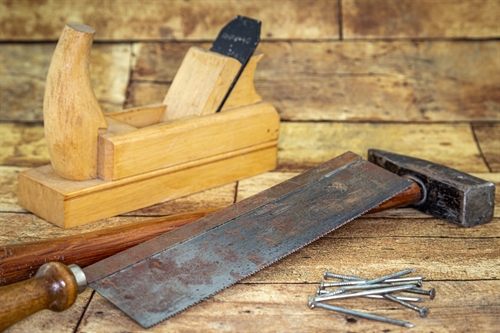Every woodcarver at some point will get a windfall of wood that sets their imagination going. But if you don’t have the space for that wood, what should you do? Do you miss out on that perfect burr ash board, or fallen pear tree, or do you accept that you’re going to have less useable space in your workshop for a while?
Another alternative is to make use of a self-storage unit to keep your lumber until you’re ready to use it.
Does wood need to be stored in a climate-controlled environment?
Wood is hygroscopic – which means it is affected by the humidity of the environment. Lumber stored in a dry environment loses moisture, while wood kept in a damp environment will gain moisture.
Green wood, or freshly sawn lumber, has a lot of moisture in it. If you want to use it for woodworking, you’ll need to season it or dry it out until it has the same moisture content as the environment in which your finished product will be used.
Anything made from wood that has more moisture in it than the environment will be prone to cracking and warping as the moisture will migrate from the wood into the environment. Similarly, wood that has less moisture in it than the environment will take on water and swell, which can cause similar problems.
This is why seasoning wood – or bringing its moisture levels into equilibrium with the moisture levels in the environment – is so important.
Many woodworkers season their wood in their workshop, or in a shed. But it may be possible to take advantage of the conditions in a climate-controlled storage unit to season boards, logs and blocks of wood.
Can I use my storage unit for woodworking?
Most storage units aren’t suitable for use as a workshop. They often don’t have power sockets and they may be poorly ventilated. But many storage companies also rent out workshop space, so check with your storage company to find out what they can do for you. There are lots of advantages to renting a workshop space away from your home – not least that you can also rent storage space nearby. Our blogpost has more information about what you can and cannot do in a storage unit.
Is the contents of my home workshop covered by my contents insurance?
Woodworking tools and materials can be costly to replace, and some of them are tempting to thieves. Many tools have sentimental value too – and while the tools themselves are irreplaceable, insurance can take some of the sting out of any loss.
Some home contents insurance will cover garages or outbuildings, but there is often a limit on the value which may not match the price of tools typically used by woodworkers. It’s likely that you will need to insure your hobby workshop separately.
When you keep tools and materials for your woodworking hobby in a storage unit these can be covered by a Store and Insure storage unit insurance policy. It’s quick and easy to get a quote for the contents of your domestic storage unit, and we’ll insure your stored goods by the day, too, so you won’t pay more than you have to.
Whether it’s some reclaimed planks with great texture and an enticing history or a section of cherry with a bowl hiding in it, or you’ve seen a great deal on carving blanks, there’s no need to miss out just because your hobby workshop is on the compact side.



